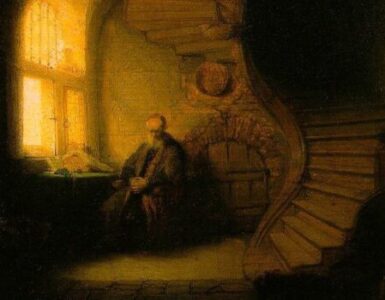Born in Vercelli, Italy in 1085, William was orphaned at an early age and raised by relatives. At the age of 14 or 15, he went on a pilgrimage to Santiago de Compostela, Spain. After his return, he decided to become a hermit and so retreated to Monte Vergine, where his holiness of life and many miracles attracted so many followers that he eventually built a monastery and wrote a rule based on the Rule of St. Benedict. After a time, however, the monks began to grumble against the strictness of the rule; in order to maintain harmony, William left with a small band of followers, including his friend, St. John of Matera, to found a second community on Monte Laceno, a most inhospitable place. When fire eventually destroyed their hermitages, William and his monks were again forced to move.
King Roger I of Naples greatly respected William and took him under his patronage, aiding him in founding many monasteries for both men and women in his kingdom. The king was so edified by William’s saintly life that he had a monastery built directly across from his palace in Salerno in order that William could serve as his advisor.
William, like so many saints, had a special premonition that his death was approaching, so he retired to his monastery at Guglietto where he died June 25, 1142. Although his other foundations did not survive, the monastery at Monte Vergine still exists today.
Lessons
1. William’s friend, St. John of Matera, served to warn William about two apparent mistakes he was making. First, William had wanted to go on pilgrimage to Jerusalem after returning from Compostela. He set out despite his friend’s advice that God wanted him to serve in Italy and was promptly set upon by robbers, which forced him to turn back and reconsider. Second was the move to Monte Laceno, a harsh, barren place where nothing would grow and the monks could barely survive. Despite John’s counsels that they should move, William refused—until their hermitages burned down. Apparently, it took some time before William learned to hear the voice of the Lord in the counsel of his holy friend. Let us pray to the Holy Spirit for the wisdom to hear His voice in the advice and encouragement of the holy people He puts in our way.
2. From the time of his youth, William practiced severe mortifications, and it seemed that nothing was too difficult for him to bear in the name of Christ. When the monks of Monte Vergine found his way of life too taxing, rather than impose his will upon them, William appointed a prior over the monastery and then left to found a new one. In that same spirit of humility, may we not look with disdain on those who do not seem to do as much or accomplish as much as we do, but remember the story of the widow who, though it was only two small coins, gave all she had to give (Lk 21:1-4).
Other Saints We Remember Today
St. Prosper of Reggio (466), Bishop













